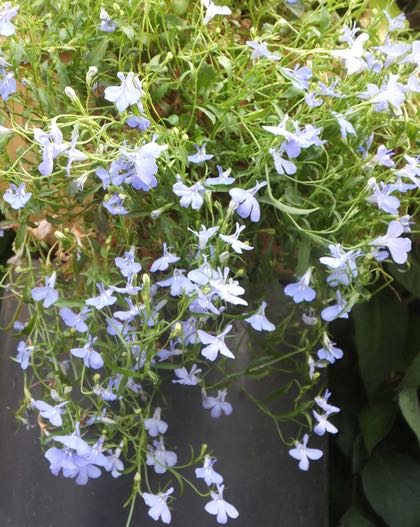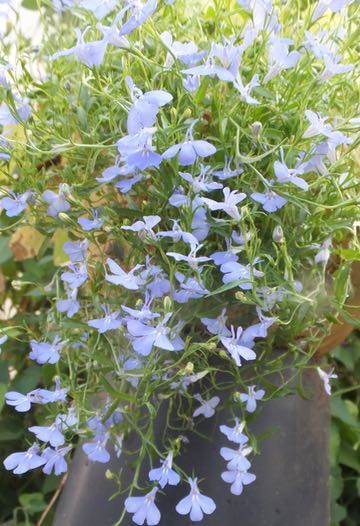
Lobelia is a world-wide genus of uncommonly good glasshouse flowers, indeed almost every member of this large genus has attractive blooms, often coming in masses, usually in a shade of blue. Lobelia has shrubby, evergreen and herbaceous members, annuals, biennials and perennials, there are even a few hardy sorts for the outdoor garden. However the vast majority need a frost free or heated greenhouse for most of the year, and extra warmth when starting off.
Although there are so many Lobelia available there is one so widely grown that almost everyone knows it by sight and that’s the sky blue L. erinus which is seen all summer in window boxes and hanging baskets almost everywhere you look. This has been popular since it’s introduction from the Cape of Good Hope in 1752 and is now available in several other shades as well as the original blue.
Sold in garden centres and on market stalls as trays of small plants from late Spring these just need planting up and romp away flowering profusely and continuously till killed by the first frosts. It could not be easier thus the popularity.
Growing from seed is not difficult either as long as you have some warmth. The seed is tiny and so is best sown over the surface of the compost in small-bore multicell trays to make small plugs of seedlings that can later be potted up.
Preferring a sandy well drained compost Lobelia is not picky and likewise puts up fairly well with erratic care. But give it regular watering and feeding and it will reward you with a fantastic show, for week after week after month.

And this does not need stop in Autumn for this Lobelia is perennial so if you take it under cover before the frosts this will bloom on, and on and on. Even right through winter into the next year without a pause if kept warm and bright enough.
Now to be fair after a year or so it does get a bit straggly so can benefit from some judicious trimming but otherwise this seldom gives any trouble and seems immune to almost every pest and disease.
Perhaps this immunity is due to chemicals in the leaves, L. inflata from N. America was once smoked medicinally, L. siphilitica was used for, well you guess, and another species, L. longiflora native in Jamaica is said to be one of the most poisonous of all plants to horses. Beautiful but dangerous!


